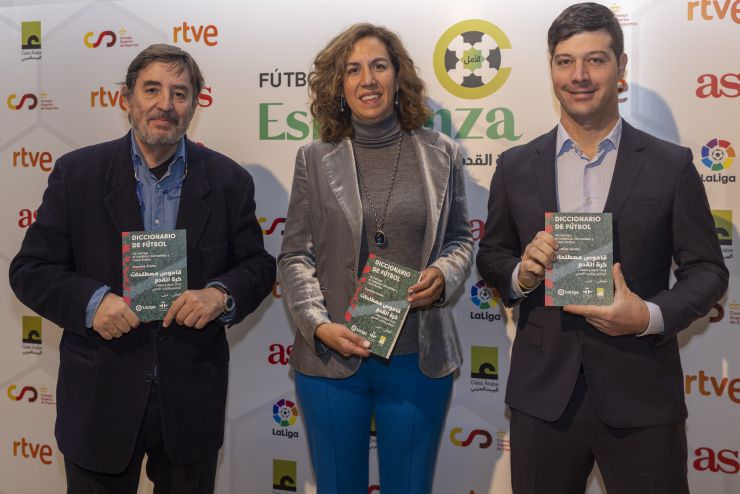Institutional
JUE 01.12.2022
Casa Árabe, LaLiga and the Instituto Cervantes presented the "Spanish-Arabic football dictionary" in Madrid today, Thursday December 1, an illustrated book that provides a complete football vocabulary in both languages to boost content creation and social interaction for fans, as well as fun facts related to the Arabic sporting world.
This illustrated dictionary includes, among its content, information about the LaLiga Santander and LaLiga SmartBank clubs and their cities of origin, the different sporting milestones and titles obtained, their players, on-field vocabulary and football actions, as well as a wide range of football terminology. It also provides additional vocabulary for social interactions, such as conversation guidelines for general concepts such as introducing oneself, talking about the weather, how to get to a place, how to interact in a restaurant, hotel or on public transport, among other things.
The event was attended by the Director General of Casa Árabe, Irene Lozano Domingo; Luis García Montero, Director of the Instituto Cervantes; and Marco De Santis, Manager of the MENA region (Middle East and North Africa) for LaLiga.
“The Arabic language, and in particular, the teaching of Arabic as a foreign language, is a key line of work at Casa Árabe as a way of directly approaching the Arab and Islamic world, its societies and cultures,” noted Casa Árabe's Director General, Irene Lozano, in the presentation. “This event unites the three most widely spoken languages in the world: Spanish, Arabic and the universal language of football, to bring cultures closer together and promote mutual understanding.”
In turn, director of the Instituto Cervantes, Luis García Montero, pointed out that the centre he runs “was created to universally promote the teaching, study and use of Spanish”, and that the Arab region is one of the regions where the Instituto Cervantes has the largest presence: Morocco is the country with the second largest number of centres, a total of six (Casablanca, Fez, Marrakech, Rabat, Tangier and Tetouan), after Brazil.
Finally, Marco de Santis, manager of the MENA region for LaLiga, stated that "The launch of the dictionary crystallises LaLiga's commitment to the MENA region. Our language and football are two of our best ambassadors abroad, and the alliance of the two is key to our strategy in
this area. LaLiga has a presence in many Arab countries: Dubai, in the United Arab Emirates, was the first of our offices abroad, and we also have delegations in countries such as Morocco, Egypt, Qatar, Turkey and Saudi Arabia. Moreover, it is a project that puts the fan at its centre, offering them new means to enjoy football.”
LaLiga has put the spotlight on the region this month: in addition to the upcoming club’s meeting in Dubai, an event that seeks to facilitate the internationalisation of clubs in these countries and help them get closer to local fans, the organisation has opened a LaLiga TwentyNine's restaurant in Doha (Qatar) together with Dani García and Grupo Alfardan. Furthermore, in 2022 it has reached a record number of 1000 students in its permanent grassroots football academy LaLiga Academy UAE (United Arab Emirates).
The publication of the dictionary is part of the Football for Hope project, an initiative in which these organisations collaborate, supported by the promotion of football as a tool for social transformation and consisting of different cultural and sporting activities. Moreover, this month, the initiative coincides with the 2022 FIFA World Cup in Qatar, the first to be held in an Arab country, and with the International Day of the Arabic Language, which is celebrated on December 18.
© LALIGA - 2022
